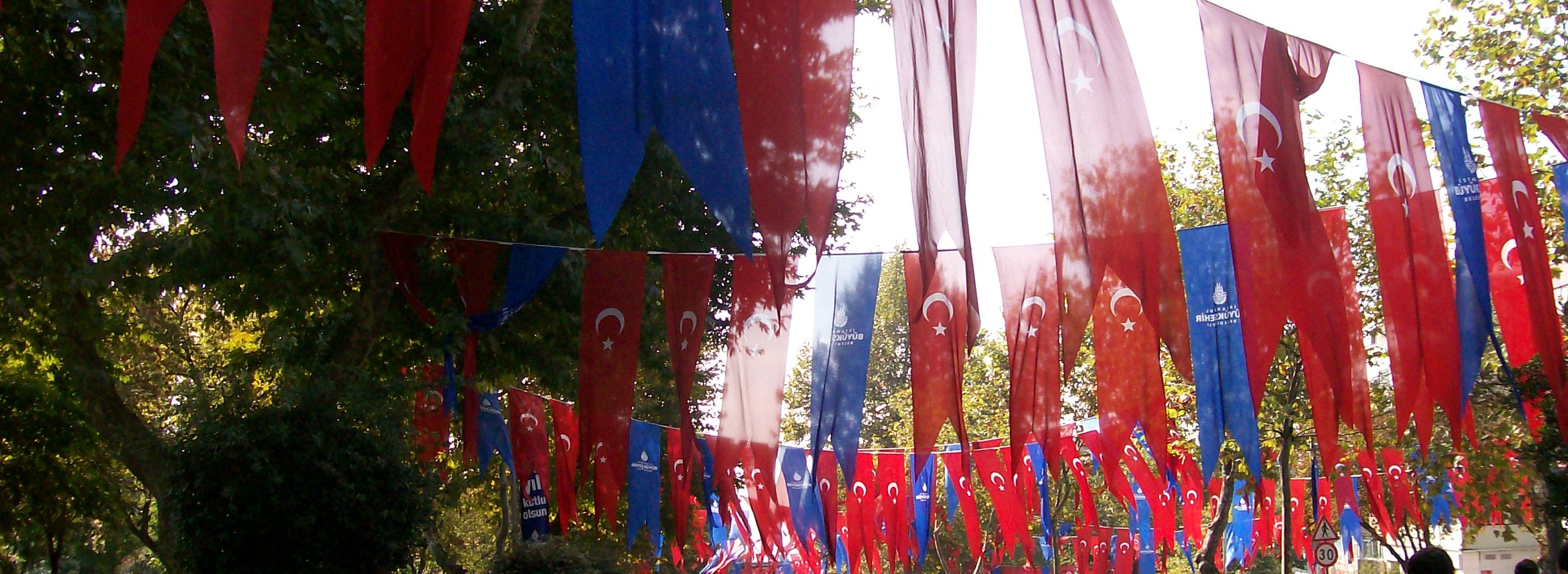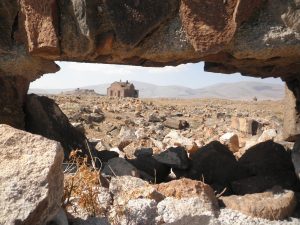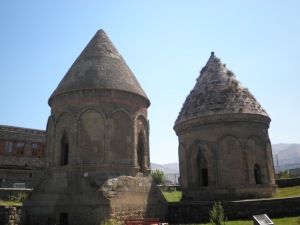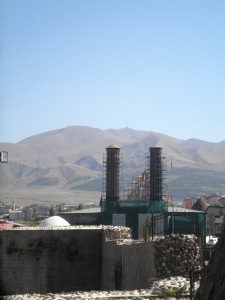In Turkey, you make plans. They rarely work out. Instead, someone takes you under their wing and makes your day better than you could ever believe or come up with on your own.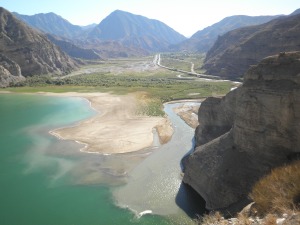
On Tuesday, I was told not to come into the office. The four Fulbrighters made plans to go a waterfall about an hour bus ride away near a town named Uzundere. I traipsed down to the bus station around 10am, bought a $5 ticket to Uzundere for 11:30, and went to buy some bread and drink 2 glasses of tea. I got on the bus, which wound its way to the other bus station in town and stopped. There was a second bus from which a horde of people descended onto our bus.
As people looked for seats on this intercity bus, the guy who sold us our tickets, came back and said, “Uzundere?” We nodded. And he pointed off the bus.
We got off the bus and asked the driver which bus. He waved opaquely to a line of vacant mini-buses. That’s when we learned, we were not being directed to a faster or correct way to get to Uzundere, they’d just oversold seats and decided to kick us off the bus. Artvin Ekspres, I shake my head in disapproval.
We found a mini-bus to Uzundere with neon orange seat covers and no one in it. Sat in the back anyway. Soon the driver came over, poked his head in the door and asked “çay?” Sure…yeah, and piled out of the bus.
We drank 2 glasses of tea with bus driver Rahmi, a conversation of pure Turkish and patience. (Though briefly Rahmi looked through an Intro to Turkish book, repeating English words out of it, with an other middle-aged Turkish man leaning over his shoulder.) We learned that his mini-bus was not leaving until 1pm, there weren’t any buses from Uzundere to the waterfall, and it was actually 24km outside town not the guidebook promised 8km. At this point, doubt about the day’s plans reached in all time high. Could we take a taxi from Uzundere? How long would it take to see things? When was the last bus back? What happened if we got stuck in this tiny Turkish town? Maybe just try again tomorrow?
Rahmi assured us that he knew the(?) taxi driver in Uzundere. One of us asked if he had a taxi. No, no taxi, but he said he had a car. Well, it’d been 3 hours with little movement, might as well keep trying. Life is an adventure. And it’s Eastern Turkey, which means life is a surprisingly inexpensive adventure. Rahmi told us Uzundere was great because of the waterfall, a church, and picnics.
We headed back to the mini-bus, which in addition to it’s outrageous seat-coverings now included a full-sized door down the aisle and other passengers. We stopped at several locales in Erzurum to pick us a bag of mail, some newspapers, prescription drugs and a small child. An hour later, we pulled into Uzundere, a town tucked into the mountains with a population of 3,200. I didn’t see a single woman without a headcovering, including the manikins. That makes it the only town I’ve been to that’s more conservative than Erzurum.
I have a theory that conservativism in Turkey is directly correlated with elevation.
Rahmi dropped each person and delivery off at their door…including the door. Then it was just the five of us. He stopped by the side of the road and ushered us out of the car. He traded his mini-bus keys with a guy who had car keys, and waved us in the car. Now this was not any car, it was a driver’s ed car from at least the 80’s, with peddles on the passenger side. And then he just started driving out of town. Up, up and up into the mountains. So much for his taxi friend.
We stopped when we got to Tortum Lake, already a good 16km from Uzundere. 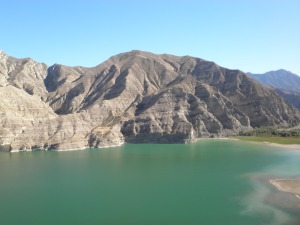 Then he drove on to Tortum Waterfall. No buses in sight (internet, why do you lie?). Now Turkish guidebooks are not the most truthful or well-researched. In the English guidebook of Erzurum, it states that Tortum Waterfall is the 3rd highest waterfall in the world, after Victoria and Niagra. Tortum is impressive, but I googled in afterward, and it doesn’t even make wikipedia’s Top 35. Therefore my interpretation is that Tortum is the 3rd highest waterfall the authors, who only kinda speak English, have heard of.
Then he drove on to Tortum Waterfall. No buses in sight (internet, why do you lie?). Now Turkish guidebooks are not the most truthful or well-researched. In the English guidebook of Erzurum, it states that Tortum Waterfall is the 3rd highest waterfall in the world, after Victoria and Niagra. Tortum is impressive, but I googled in afterward, and it doesn’t even make wikipedia’s Top 35. Therefore my interpretation is that Tortum is the 3rd highest waterfall the authors, who only kinda speak English, have heard of.
However, there was a nice set of steps down to the base of the waterfall. Rahmi probably took more pictures than I did. Especially of us. With his phone, he was either talking or taking pictures with, at least 50% of the time. There was a lot of, “very, very beautiful” from us.
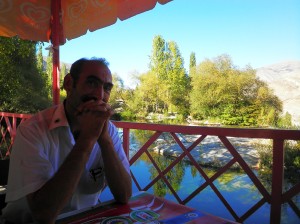 After that we drank tea at the top of the waterfall. And we had almost the same conversation that we’d had back at the bus station. (Are you students or teachers? How long are you here? When did you get here?) Rahmi had this ah-ha moment where he figured out that we could be friends for a long time and have lots of picnics in Erzurum and Uzundere. He told us the last bus back to Erzurum was at 8pm, and asked what we should do until then. It was about 4pm and that was his invitation to spend the next 4 hours with us, along with the last 4 hours.
After that we drank tea at the top of the waterfall. And we had almost the same conversation that we’d had back at the bus station. (Are you students or teachers? How long are you here? When did you get here?) Rahmi had this ah-ha moment where he figured out that we could be friends for a long time and have lots of picnics in Erzurum and Uzundere. He told us the last bus back to Erzurum was at 8pm, and asked what we should do until then. It was about 4pm and that was his invitation to spend the next 4 hours with us, along with the last 4 hours.
We went back to the lake and had a picnic there. Rahmi moved seat-sized rocks for us to sit on during our picnic. Then our conversations got interesting. He wanted to know about America. What we do in the evening, whether there’s manti, whether there are cowboys…
After that, Rahmi wanted to take us to a church nearby. We drove off the main road, into a little town. It was so small that he honked at whatever tea house he went past. “Your friends?” “No, just saying ‘hi’.” In the middle of this little town, was a huge Gerogian Church built in 963. It’s slowly disintegrating, but utterly magestic, right next to tiny tea shops and houses.
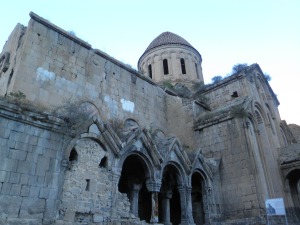

 Rahmi asked us what churches were like in the US, and nobody had the vocab for that. There was an old guy there whose sole purpose of retirement was to dress nicely and get as many people as possible to take his picture. I obliged.
Rahmi asked us what churches were like in the US, and nobody had the vocab for that. There was an old guy there whose sole purpose of retirement was to dress nicely and get as many people as possible to take his picture. I obliged.
 Afterward, Rahmi drove back to Uzundere, a good 50km round trip. We got gas and one of the other Americans wondered how much this “taxi ride” would cost us, if we would have enough to cover it. But these were acts of hospitality and friendship, as only Eastern Turks provide in this sheer quality and quantity, with no previous interaction.
Afterward, Rahmi drove back to Uzundere, a good 50km round trip. We got gas and one of the other Americans wondered how much this “taxi ride” would cost us, if we would have enough to cover it. But these were acts of hospitality and friendship, as only Eastern Turks provide in this sheer quality and quantity, with no previous interaction.
In a town of 3200, Rahmi knows everyone. He handed the keys of the car to a different guy who drove off, I kind of doubt that’s even Rahmi’s car. We sat outside, drank 2 more glasses of tea, met his friends and played backgammon. While I know the concept of backgammon and ever some strategy, they play so much backgammon that they rarely consider a move longer than half a second. That means if you consider a move for more than that, you don’t know what you’re doing and Rahmi or his friend will move for you. Lets just say I didn’t win, but it was fun. I think he might actually be moving my pieces in this picture.
 It got later and Rahmi handed a 12-year-old five bucks and told him to go buy food. He came back and prepared a spread of the freshest of grapes, tomatoes, cucumbers, cheese, olives and bread. It put our picnic to shame. We had long discussions over dinner about American history and family history. There was serious interest in who Americans are. Are we really just Germans or Irish or Italian? Where’s your father and mother from? Your grandfather? Your great grand-father? And on up the line. One of his friends named each ancestor back 7 generations and said that was the point his family moved from Kyrgyzstan.
It got later and Rahmi handed a 12-year-old five bucks and told him to go buy food. He came back and prepared a spread of the freshest of grapes, tomatoes, cucumbers, cheese, olives and bread. It put our picnic to shame. We had long discussions over dinner about American history and family history. There was serious interest in who Americans are. Are we really just Germans or Irish or Italian? Where’s your father and mother from? Your grandfather? Your great grand-father? And on up the line. One of his friends named each ancestor back 7 generations and said that was the point his family moved from Kyrgyzstan.
They also spent a serious amount of time trying to figure out what the English word was for “your aunt’s daughters.” I think they were trying to communicate that we should consider ourselves their nieces.
Rahmi then looked up the English word for “invitation” and told us to come back on Sunday for the (looking up another word) oil wrestling festival that has live music. Now that sounds like culture. We nodded and he began writing down bus times for us, always ending with a pantomime of us getting off a bus, calling him and saying “Alo?”
At 7:40, Rahmi heard the bus coming and ran into the street to flag it down. One of the Americans asked, “How much?” referring to his grand tourism of the last 8 hours. Rahmi took it to mean for the bus back: why, $5 of course. The bar for hospitality has been set high.
Summary: Drank 2 cups of tea. Got on a bus to Uzundere. Got kicked off the bus. Sat on an unmoving mini-bus to Uzundere. Got invited to drink tea by the bus driver, Rahmi. Drank 2 cups of tea. Got back on the mini-bus that now included deliveries of mail, prescription drugs, a small child, and a full-sized door. Upon arriving in Uzundere, Rahmi directed us to a student-driving car, which he drove 25km to Tortum Lake and Waterfall. Drank 2 cups of tea. Had a picnic. Talked about cowboys in Turkish. Drove to a HUGE Georgian Church in a random town. Drank 2 cups of tea. Played backgammon. Ate dinner. Got invited back for Sunday’s Wrestling and Live Music Festival. Got back on a bus to Erzurum. Summary: 8 cups of tea, 8 hours of Turkish Hospitality…there will be oil wrestling on Sunday.
